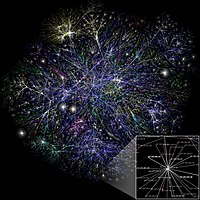
Photo from wikipedia
In Internet of Things (IoT) applications, sometimes the quality of service (QoS) of throughput for transmitting video or the QoS of bounded delay for control of a sensor node is… Click to show full abstract
In Internet of Things (IoT) applications, sometimes the quality of service (QoS) of throughput for transmitting video or the QoS of bounded delay for control of a sensor node is required. A traditional contention-based medium access control (MAC) protocol cannot meet the adaptive traffic demands of these networks and confers delay-related constraints. Q-learning (QL) is one of the reinforcement learning (RL) mechanisms and can potentially be the future machine learning scheme for spectrum MAC protocols in IoT networks. In this study, a QL-based MAC protocol is proposed to facilitate adaptive adjustment of the length of the contention period in response to the ongoing traffic rate in IoT networks. The novelty of QL-based MAC lies in its use of RL to dynamically adjust the length of the contention period according to the traffic rate. The QL-based MAC will solve the models without additional input information to adapt to environmental variations during training. We confirm that the proposed QL-based MAC protocol with node contention is robust. In addition, we showed that our proposed QL-based MAC protocol has higher system throughput, lower end-to-end delay, and lower energy consumption in MAC contention than those of contention-based MAC protocols.
Journal Title: IEEE Access
Year Published: 2021
Link to full text (if available)
Share on Social Media: Sign Up to like & get
recommendations!